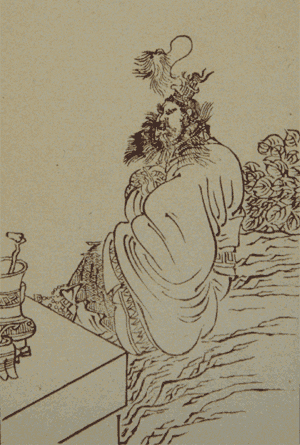
Taoism or Daoism is a diverse tradition indigenous to China, variously characterized as both a philosophy and a religion. Taoism emphasizes living in harmony with the Tao—generally understood as being the impersonal, enigmatic process of transformation ultimately underlying reality. The concept originates in the Chinese word 道, which has numerous related meanings: possible English translations include 'way', 'road', and 'technique'. Taoist thought has informed the development of various practices within the Taoist tradition and beyond, including forms of meditation, astrology, qigong, feng shui, and internal alchemy. A common goal of Taoist practice is self-cultivation resulting in a deeper appreciation of the Tao, and thus a more harmonious existence. There are different formulations of Taoist ethics, but there is generally emphasis on virtues such as effortless action, naturalness or spontaneity, simplicity, and the three treasures of compassion, frugality, and humility. Many Taoist terms lack simple definitions and have been translated in several different ways.

The Three Pure Ones, also translated as the Three Pure Pellucid Ones, the Three Pristine Ones, the Three Divine Teachers, the Three Clarities, or the Three Purities, are the three highest gods in the Taoist pantheon. They are regarded as pure manifestations of the Tao and the origin of all sentient beings, along with the "lords of the Three Life Principles or 'Breaths' (qi)". They were also gods who were "associated with the sky, the earth and the underworld."

Zhang Ling, courtesy name Fuhan, was a Chinese religious leader who lived during the Eastern Han dynasty credited with founding the Way of the Celestial Masters sect of Taoism, which is also known as the Way of the Five Pecks of Rice, and he is credited as being the founder of Taoism in legend.
The Three Treasures or Three Jewels are basic virtues in Taoism. Although the Tao Te Ching originally used sanbao to mean "compassion", "frugality", and "humility", the term was later used to translate the Three Jewels in Chinese Buddhism, and to mean the Three Treasures in Traditional Chinese Medicine.
The Daozang is a large canon of Taoist writings, consisting of around 1,400 texts that were seen as continuing traditions first embodied by the Daodejing, Zhuangzi, and Liezi. The canon was assembled by monks c. 400 CE in an attempt to bring together these disparate yet consonant teachings, and it included commentaries and expositions from various masters on material found in the aforementioned core texts of Taoism. The anthology consisted of three divisions based on what were seen at that time in Southern China as Taoism's primary focuses: meditation, ritual, and exorcism. These three grottoes were ranked by skill level—with exorcism being the lowest and meditation the highest—and used for the initiation of Taoist masters.

The Lingbao School, also known as the School of the Sacred Jewel or the School of Numinous Treasure, was an important Daoist school that emerged in China in between the Jin dynasty and the Liu Song dynasty in the early fifth century CE. It lasted for about two hundred years until it was absorbed into the Shangqing and Zhengyi currents during the Tang dynasty. The Lingbao School is a synthesis of religious ideas based on Shangqing texts, the rituals of the Celestial Masters, and Buddhist practices.
The Huahujing is a Taoist work, traditionally attributed to Laozi.
Ge Chaofu is a member of the Chinese Ge family who lived during the 4th and 5th centuries CE. He is best known for writing the Taoist scripture known as The Five Talismans (Wufujing) which forms the basis of the beliefs of the Lingbao School of Taoism. Beyond this, very little is known about Ge Chaofu and his life.
The history ofTaoism stretches throughout Chinese history. Originating in prehistoric China, it has exerted a powerful influence over Chinese culture throughout the ages. Taoism evolved in response to changing times, with its doctrine and associated practices being revised and refined. The acceptance of Taoism by the ruling class has waxed and waned, alternately enjoying periods of favor and rejection. Most recently, Taoism has emerged from a period of suppression and is undergoing a revival in China.

Ge Xuan (164–244), courtesy name Xiaoxian, was a Chinese Taoist practitioner who lived during the eastern Han dynasty (25–220) and Three Kingdoms periods (220–280). He was the ancestor of Ge Hong and a resident of Danyang Commandery in the state of Eastern Wu during the Three Kingdoms period. Ge Xuan's paternal grandnephew, Ge Hong, gave him the title "Ge Xuan Gong", which translates as "Immortal Lord" or "Transcendent Duke". Ge Hong wrote extensively about his great-uncle, and said that some alchemical texts from his Baopuzi originally came from him. Ge Xuan was described by his descendant, Ge Chaofu, as the first recipient of the Lingbao sacred scriptures. He is remembered as a member of the Chinese Ge family and a prominent figure in the early development of Taoism.

The Way of the Five Pecks of Rice or the Way of the Celestial Master, commonly abbreviated to simply The Celestial Masters, was a Chinese Taoist movement founded by the first Celestial Master Zhang Daoling in 142 CE. At its height, the movement controlled a theocratic state in the Hanzhong valley, north of Sichuan. In 215 CE, the state was incorporated by Cao Cao into what would later be the Kingdom of Wei, and the followers of the Celestial Master were dispersed all over China.
Li Hong is a soteriological figure in religious Daoist prophecies wherein he appears at the end of the world cycle to rescue the chosen people, who would be distinguished by certain talismans, practices, and virtues.
The concept of sin, in the sense of violating a universal moral code, was unknown in Chinese philosophy and folk religion until around the second century CE, when Buddhism arrived from India and religious Daoism originated. While English lexically differentiates theological sin from legal crime, the Chinese language uses one word zui 罪 meaning "crime; guilt; misconduct; sin; fault; blame."

Taoist meditation, also spelled Daoist, refers to the traditional meditative practices associated with the Chinese philosophy and religion of Taoism, including concentration, mindfulness, contemplation, and visualization. The earliest Chinese references to meditation date from the Warring States period.
The Xiaodao Lun is an anti-Daoist polemic written in 570 for the Emperor Wu of Northern Zhou (543–578) by the Buddhist courtier Zhen Luan. After holding several inconclusive debates in the court, Emperor Wu commissioned the Xiaodao Lun as one of two reports examining the suitability of sponsoring either Buddhism or Daoism as a state religion for the Northern Zhou dynasty, with a view towards unifying China. The Xiaodao Lun mocked Daoist practices, accused Daoists of plagiarizing Buddhist texts, and portrayed the religion as dangerous to social stability. Its advice was disregarded by the Emperor, who supported the preservation of Daoism, but his dynasty was ultimately short-lived. Zhen Luan's Xiaodao Lun is preserved in the Chinese Buddhist canon and is consulted for its quotations of Daoist texts that have not been preserved until today.

Taoism is an East Asian religion founded in ancient China with many schools or denominations, of which none occupies a position of orthodoxy and co-existed peacefully. Taoist branches usually build their identity around a set of scriptures, that are manuals of ritual practices. Scriptures are considered "breathwork", that is "configurations of energy" (qi), embodiments of "celestial patterns" (tianwen), or "revelations of structures" (li).
The following outline is provided as an overview of and topical guide to Taoism:

The Zhengao written in 499 CE is the Shangqing Daoist patriarch Tao Hongjing's comprehensive collection of poetry and prose from the original "Shangqing revelations", which were supposedly given to the mystic Yang Xi by a group of Daoist zhenren Perfected Ones from 364 to 370. This classic text has long been famous both as a foundational text of religious Daoism and as a brilliant exemplar of medieval Chinese poetry.
Taoist philosophy also known as Taology refers to the various philosophical currents of Taoism, a tradition of Chinese origin which emphasizes living in harmony with the Dào. The Dào is a mysterious and deep principle that is the source, pattern and substance of the entire universe.
Lu Xiujing, known by the courtesy name Yuande (元德) and the posthumous name Jianji (簡寂), was a Taoist compiler and ritualist who lived under the Liu Song dynasty. His education was of Confucianist leaning. Nevertheless, he chose to study Taoism. Lu was devoted to his faith to the point of abandoning his family.








